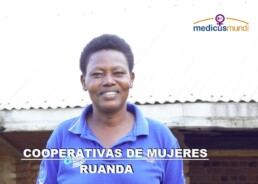
Odette Nyiramana’s experience and the great transformation that seven rural cooperatives run by medicusmundi in Rwanda, including hygiene clubs, have had on her life and that of 414 women. “Thanks to the cooperatives, we now know and understand our rights.”
Since 2010, medicusmundi has been setting up women’s cooperatives in Rwanda. Today they are located in the sectors of Karama, Kayenzi, Ngamba, Runda, Gacurabwenge and Rugalika, in the Kamonji region. From the outset, the women cooperative members positioned themselves as protagonists of change, and began their work in the nutritional care centres where they went with their children who were acutely or severely malnourished.
Since then, much has changed. This is not only reflected in the fact that there are now no malnourished families, but also that they now have a number of tools that they have acquired along the way. Their learning includes improving their nutritional knowledge, functional literacy, learning agricultural, livestock and handicraft skills, and conflict management and resolution.
Odette Nyirimana is the president of one of the cooperatives and also the animator of the Hygiene Club within the TUBEHO NEZA project: “In the cooperative we have participated in many trainings and workshops in different fields. For example, training in agricultural management, horticulture, small livestock farming, sewing, etc., which help us to improve and make the most of all our work”. Odette explains that their participation also focuses on trainings that have helped them to advance as individuals and improve their standard of living, such as the workshop on gender balance and promotion, the workshop on human rights, the workshop on conflict resolution or the workshop on child nutrition. He adds: “Currently, for example, we are working on a hygiene and sanitation promotion project. And among the planned activities are the Hygiene Clubs, training workshops on hygiene and sanitation, soap making and Sanplats, among other initiatives”.
These women have improved in many areas along the way. Many of them point out that they did not know how to read or write before joining the cooperatives, due to the conditions of poverty or the discrimination they suffered from regarding the right to education. Now, after much personal effort, they are all able to access previously hidden information, and many have even become teachers.
They also feel more respected in their homes and feel that their family members’ perception of them has improved and they are valued much more than before, they feel integrated in their homes.
Odette tells us that their rights are now also respected: “In the cooperative we have participated in trainings on rights and equality between women and men, now we see where and when they are not respected, and then we can give our opinion. We have also made a lot of progress in active and voluntary participation in decision-making without any discrimination, which is a big step for women in this area”. In fact, some women in the cooperatives are leaders at the community level, such as the community health officer, or the leader of the ISIBO (village community organisation), as well as the women’s leader at sector or regional level.
Of course, economic independence has helped a lot in this regard. Odette explains: “The cooperatives have increased the income for our families. This income helps us to improve our lifestyle, i.e. we pay the Mutuelle de Sante (access to basic health care), we can buy clothes and shoes, buy some materials and equipment in the house and also pay school fees, for example.
Kamonyi’s 7 rural cooperatives in Rwanda are constituted as people-centred platforms. Through them, they enable the pooling of assets, skills and strengths to collectively meet the needs of the members and, in this way, build a common future and foster the development of future generations. They have become a space of solidarity and mutual aid that pursues collective development through the rational exploitation of common goods, such as cultivated fields, sewing machines, modern greenhouses, craft workshops, but also through the learning acquired and the sorority organised around them.
………………..
English translation of an article first published by Medicus Mundi Spain in Spanish
Original post with links to references: here
